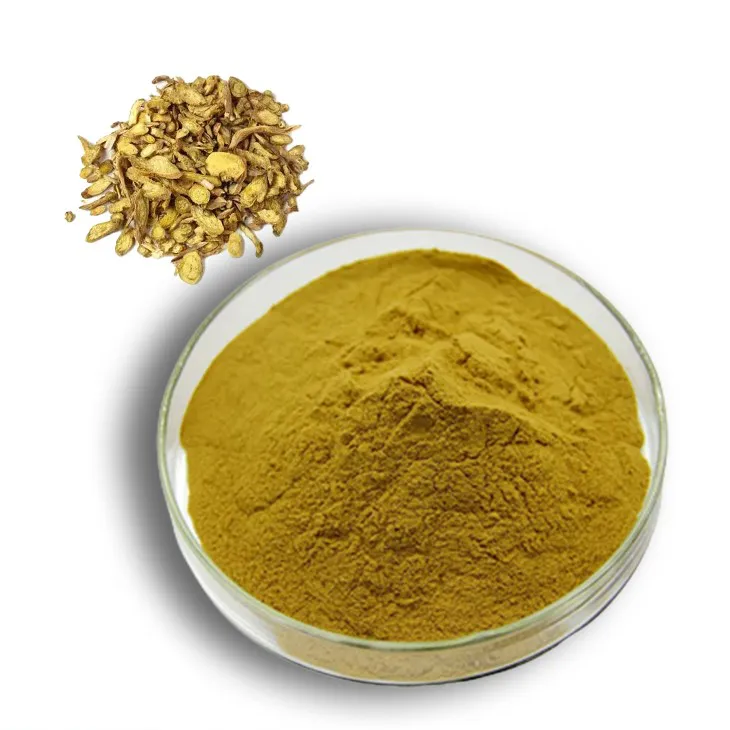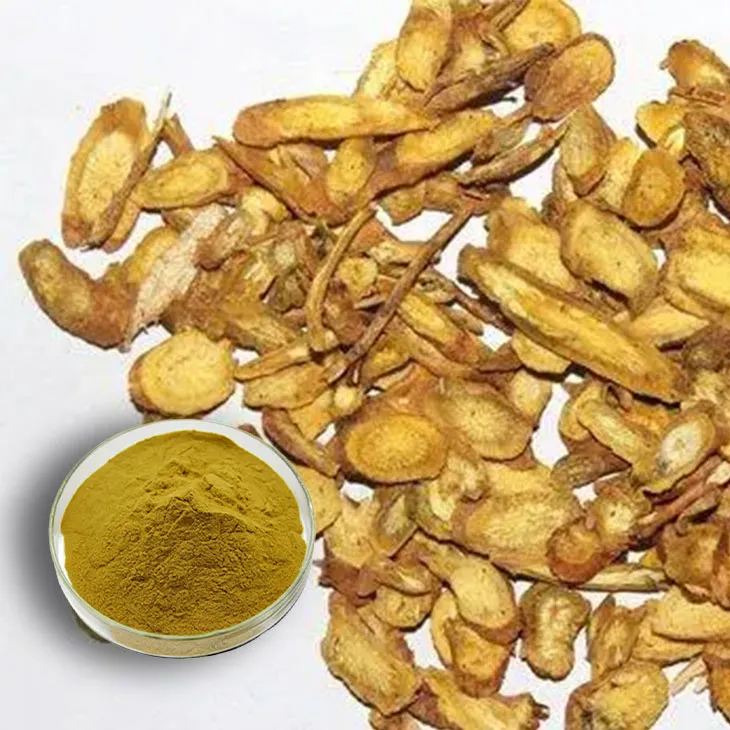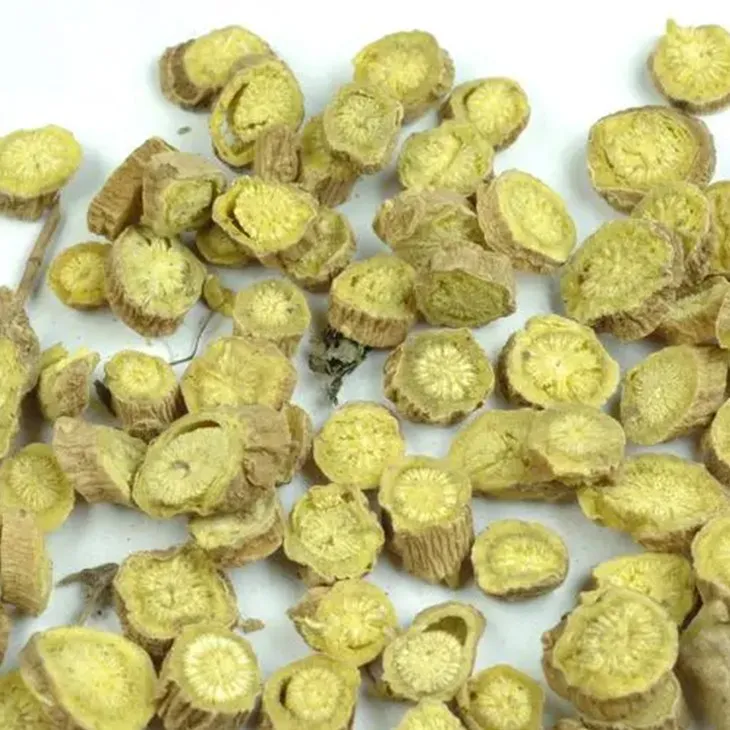- 0086-571-85302990
- sales@greenskybio.com
Baicalin: Benefits, Uses and Possible Side Effects
2024-11-12

1. Introduction
Baicalin is a compound that has been attracting increasing attention in recent years due to its various properties. It is a flavonoid glycoside, mainly derived from the roots of Scutellaria baicalensis, a plant with a long history of use in traditional medicine. Baicalin's potential health benefits, diverse uses, and possible side effects are important aspects to consider, which will be explored in detail in this article.

2. Benefits of Baicalin
2.1 Cardiovascular Protection
One of the most significant benefits of baicalin is its role in protecting the cardiovascular system. Lowering blood pressure is one of the ways it contributes to heart health. High blood pressure is a major risk factor for various cardiovascular diseases, and baicalin has been shown to have a regulatory effect on blood pressure. It may act on the smooth muscle cells of blood vessels, promoting their relaxation and thus reducing peripheral resistance, which is directly related to blood pressure levels.
In addition to blood pressure regulation, baicalin also helps in cholesterol management. Elevated cholesterol levels, especially high levels of low - density lipoprotein (LDL) cholesterol (the so - called "bad" cholesterol), are associated with an increased risk of atherosclerosis. Baicalin has been found to interfere with cholesterol metabolism in the body. It may inhibit the absorption of dietary cholesterol in the intestine or promote the excretion of cholesterol from the body, thereby helping to maintain healthy cholesterol levels.
2.2 Anti - Inflammatory Properties
Baicalin also exhibits strong anti - inflammatory effects. Inflammation is a complex biological response that is involved in many diseases, including autoimmune diseases, cardiovascular diseases, and certain types of cancer. Baicalin can target various components of the inflammatory response. For example, it can inhibit the production of pro - inflammatory cytokines such as interleukin - 1β (IL - 1β) and tumor necrosis factor - α (TNF - α). These cytokines are key mediators in the inflammatory process, and their overproduction can lead to chronic inflammation.
Moreover, baicalin can also modulate the activity of immune cells involved in inflammation. It may suppress the activation of macrophages, which are cells that play a central role in the innate immune response and can secrete a large number of inflammatory mediators. By reducing the excessive activation of macrophages, baicalin helps to control the inflammatory response at an early stage.
2.3 Antioxidant Activity
Another important benefit of baicalin is its antioxidant activity. Oxidative stress occurs when there is an imbalance between the production of reactive oxygen species (ROS) and the body's antioxidant defense system. ROS can damage cells, proteins, and DNA, which is associated with aging and the development of various diseases. Baicalin can act as a free - radical scavenger, effectively neutralizing ROS such as superoxide anions, hydroxyl radicals, and peroxyl radicals.
Baicalin's antioxidant activity is also related to its ability to upregulate the expression of antioxidant enzymes in the body. These enzymes, such as superoxide dismutase (SOD), catalase (CAT), and glutathione peroxidase (GPx), play a crucial role in the body's antioxidant defense. By enhancing the activity of these enzymes, baicalin helps to strengthen the body's antioxidant capacity and protect cells from oxidative damage.

3. Uses of Baicalin
3.1 In the Cosmetic Industry
Baicalin has found wide applications in the cosmetic industry. One of its main uses is for its anti - aging effects. As people age, the production of collagen in the skin gradually decreases, leading to the loss of skin elasticity and the formation of wrinkles. Baicalin can stimulate the production of collagen in fibroblasts, the cells responsible for collagen synthesis in the skin. By promoting collagen production, it helps to maintain the firmness and elasticity of the skin, reducing the appearance of wrinkles.
Baicalin also has anti - inflammatory and antioxidant properties in the context of skin health. Inflammatory skin conditions such as acne, eczema, and psoriasis are often associated with oxidative stress and an overactive immune response. Baicalin can help to soothe inflamed skin, reduce redness, and protect the skin from further damage caused by free radicals. It can be added to various skincare products, such as creams, lotions, and serums, to provide these beneficial effects for the skin.
3.2 In Traditional Medicine
In traditional medicine, baicalin - containing plants have been used for centuries to treat various ailments. In Chinese traditional medicine, for example, Scutellaria baicalensis is often used to clear heat and dampness, purify fire, and relieve restlessness. It has been used to treat conditions such as fever, cough, and diarrhea. Although modern scientific research is still exploring the exact mechanisms underlying these traditional uses, it is believed that baicalin and other bioactive components in the plant play important roles.
Some traditional medicine systems also use baicalin - containing preparations for the treatment of liver and gallbladder disorders. It is thought that baicalin may have a hepatoprotective effect, protecting the liver from damage caused by toxins, drugs, or viral infections. However, more research is needed to fully understand and validate these traditional uses in the context of modern medicine.

4. Possible Side Effects of Baicalin
4.1 General Side Effects
While baicalin has many potential benefits, it is also important to be aware of its possible side effects. In some cases, high doses of baicalin may lead to dizziness and headaches. These symptoms may be related to its pharmacological effects on the nervous system. However, the occurrence of these side effects may vary from person to person, and the exact mechanisms underlying them are not yet fully understood.
4.2 Special Considerations for Pregnant Women
Pregnant women should be particularly cautious when using products containing baicalin. The safety of baicalin for fetal development has not been fully established. Although there is currently no conclusive evidence that baicalin is harmful during pregnancy, it is better to err on the side of caution. Pregnant women should consult their healthcare providers before using any products or supplements that contain baicalin.
4.3 Drug Interactions
Baicalin may also interact with certain drugs. For example, it may affect the metabolism of drugs that are metabolized by cytochrome P450 enzymes in the liver. If a person is taking medications such as warfarin (an anticoagulant), the use of baicalin may potentially increase or decrease the effectiveness of the drug, which could lead to adverse effects. Therefore, it is important for individuals taking medications to inform their healthcare providers if they plan to use baicalin - containing products.

5. Conclusion
Baicalin is a bioactive compound with a wide range of potential benefits, including cardiovascular protection, anti - inflammatory, and antioxidant properties. It has various uses in the cosmetic industry and traditional medicine. However, possible side effects such as dizziness, headaches, and potential risks during pregnancy, as well as drug interactions, should not be overlooked. More research is needed to fully understand the mechanisms of action of baicalin, optimize its use, and ensure its safety in different populations. Overall, baicalin holds great promise as a natural compound with potential health - promoting and therapeutic applications, but its use should be carefully considered and monitored.
FAQ:
What are the main benefits of baicalin?
Baicalin has diverse benefits. One of its main benefits is the protection of the cardiovascular system. It can help reduce blood pressure and cholesterol levels, which in turn decreases the risk of heart diseases. It also has anti - aging effects and can be added to skincare products as it promotes collagen production and reduces wrinkles.
How does baicalin protect the cardiovascular system?
Baicalin protects the cardiovascular system by reducing blood pressure and cholesterol levels. By doing so, it lessens the risk of developing heart diseases.
What are the uses of baicalin in the cosmetic industry?
In the cosmetic industry, baicalin can be added to skincare products. Its anti - aging effects make it useful, as it promotes collagen production and helps in reducing wrinkles.
What possible side effects does baicalin have?
High doses of baicalin may cause dizziness and headaches in some people. Also, pregnant women should be cautious when using products containing baicalin because its safety for fetal development has not been fully established.
Why should pregnant women be cautious with baicalin?
Pregnant women should be cautious with baicalin because its safety for fetal development has not been fully established.
Related literature
- Baicalin: A Comprehensive Review of Its Pharmacological Properties"
- "The Role of Baicalin in Cardiovascular Health: Recent Research Findings"
- "Baicalin in Cosmetics: Efficacy and Safety Considerations"
- ▶ Hesperidin
- ▶ Citrus Bioflavonoids
- ▶ Plant Extract
- ▶ lycopene
- ▶ Diosmin
- ▶ Grape seed extract
- ▶ Sea buckthorn Juice Powder
- ▶ Fruit Juice Powder
- ▶ Hops Extract
- ▶ Artichoke Extract
- ▶ Mushroom extract
- ▶ Astaxanthin
- ▶ Green Tea Extract
- ▶ Curcumin
- ▶ Horse Chestnut Extract
- ▶ Other Product
- ▶ Boswellia Serrata Extract
- ▶ Resveratrol
- ▶ Marigold Extract
- ▶ Grape Leaf Extract
- ▶ New Product
- ▶ Aminolevulinic acid
- ▶ Cranberry Extract
- ▶ Red Yeast Rice
- ▶ Red Wine Extract
-
Sophora Japonica Flower Extract
2024-11-12
-
Hericium erinaceus extract powder
2024-11-12
-
Coix Seed Extract
2024-11-12
-
Wheat Germ Extract
2024-11-12
-
Baicalin
2024-11-12
-
Feverfew Extract
2024-11-12
-
Red Date Extract
2024-11-12
-
Maca Extract
2024-11-12
-
Camu Camu Extract
2024-11-12
-
Mulberry leaf Extract
2024-11-12




















